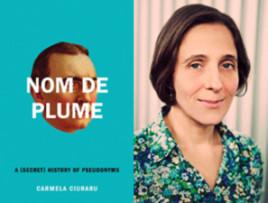In her new book, Nom de Plume: A (Secret) History of Pseudonyms (Harper), author and journalist Carmela Ciuraru takes a considered and considerate look at writers who have chosen to release works under a pseudonym.
The obvious question, then: Has Ciuraru ever used a pseudonym?
She laughed, and said, "When I was in college, somewhat as a joke, I used to publish poems and stories as 'Carmela Smith.' But when it comes to my work now, I don't feel that anything I publish is scandalous or shameful, so I don't feel the need to use a pen name."
Ciuraru noted that in the stories she chose to showcase in her book, it very often was shame, scandal or even both that led authors to come up with false names. "Historically it's been about those things," she said. "But our culture has really swung in the other direction. People will tell any story now. Personally, I kind of mourn the loss of reticence in culture."
 In the 19th century, Ciuraru explained, writers "didn't want it both ways. They weren't trying to draw attention to both their work and their person." For example, Charles Dodgson, also known as Lewis Carroll, was more interested in his work garnering praise than in being recognized on his own.
In the 19th century, Ciuraru explained, writers "didn't want it both ways. They weren't trying to draw attention to both their work and their person." For example, Charles Dodgson, also known as Lewis Carroll, was more interested in his work garnering praise than in being recognized on his own.
One of the reasons that writers choose pseudonyms, Ciuraru believes, after researching stories as multivarious as Lewis Carroll's, Mark Twain's, George Eliot's and George Orwell's, is the freedom it affords. "A nom de plume expresses one part of you. These writers realized that we all have so many facets, so many different parts. You can even be a different person as you go through your day--at your agent's office you're playing a hotshot writer. At the market, you're playing a neighborhood character. When you take your kid to school, you're playing well-informed mom, and so on."
Previously, Ciuraru edited the poetry anthologies First Loves: Poets Introduce the Essential Poems That Captivated and Inspired Them and Solitude Poems, but this is her first time as an author. "My vocation is as a reader of poems. I want my legacy to be 'She did not add to the world's trove of bad poetry!' " That impulse to hold back also informs her new book. "One thing that stuck with me as early as high school was that so many people assume the 'I' of a poem is the poet herself, and it's not. It's a persona. Karen von Blixen, who wrote as Isak Dinesen, said she took a nom de plume 'so I didn't have to answer stupid questions.' This book is partly a love letter from me to literature and its creators, trying to show that I understand their epic struggles."
After delving into the biographies of the writers included in her book, Ciuraru realized how brave they were in seeking to stake out a place for their creative work that was separate from their public lives. "That's why I prefer the term nom de plume," she said. "While pseudonym is a great term, it does technically mean 'fake,' and the authors who used these names most powerfully were anything but fake."
George Eliot, for example, was born Mary Ann Evans, whose self-perceived homely appearance and formidable intellect led her to prefer living as "George." "It allowed her the freedom she craved and could not access as a woman of her time," Ciuraru explained. "For Eliot, fortunately, that pseudonymous persona was empowering. Other writers experienced it almost to a fault, like the 20th-century Alice Sheldon, whose 'James Tiptree' self was so powerful that without him, she felt dead--and ultimately killed her husband and herself."
Ciuraru also points to George Orwell, who was born the well-to-do Eric Blair, but cast off his name so he could live among and write about the working poor. "Many of these writers were telling a lie so that they could tell the truth. You don't see that with today's writers and pen names. They often hide behind a pen name because they're trying to hide behind a lie, like JT Leroy."
Where writers once used use noms de plume to conceal gender, sexual identity or ethnic origins, today the biggest taboo is money. "Today, shame is not getting a big advance, or not selling rights to a film adaptation," said Ciuraru. "Once upon a time, we didn't put authors into tidy boxes so easily. Something has been lost in the distance we once had from our authors. Now, too many authors want to share a really dramatic personal story and receive the glory for it, too. I'm not sure that's possible."
Is there still a need for pen names? Ciuraru laughs. "I think they still give us a certain kind of power. They're secret, and secrets are fun. They also provide artistic freedom. Think about it: a pseudonym takes you back to childhood, when you could say 'I'm a pony! I'm a lion!' Or even, 'I'm about to write the most important novel of the 21st century!' without censoring yourself."
As for Ciuraru, we'll see what's next. "As I once heard Whiting Award winner Mark Doty say, this writer's life is a lonely process. You win an award, but you still have to go back to your desk the next day and sit down and put pen to paper." --Bethanne Patrick

